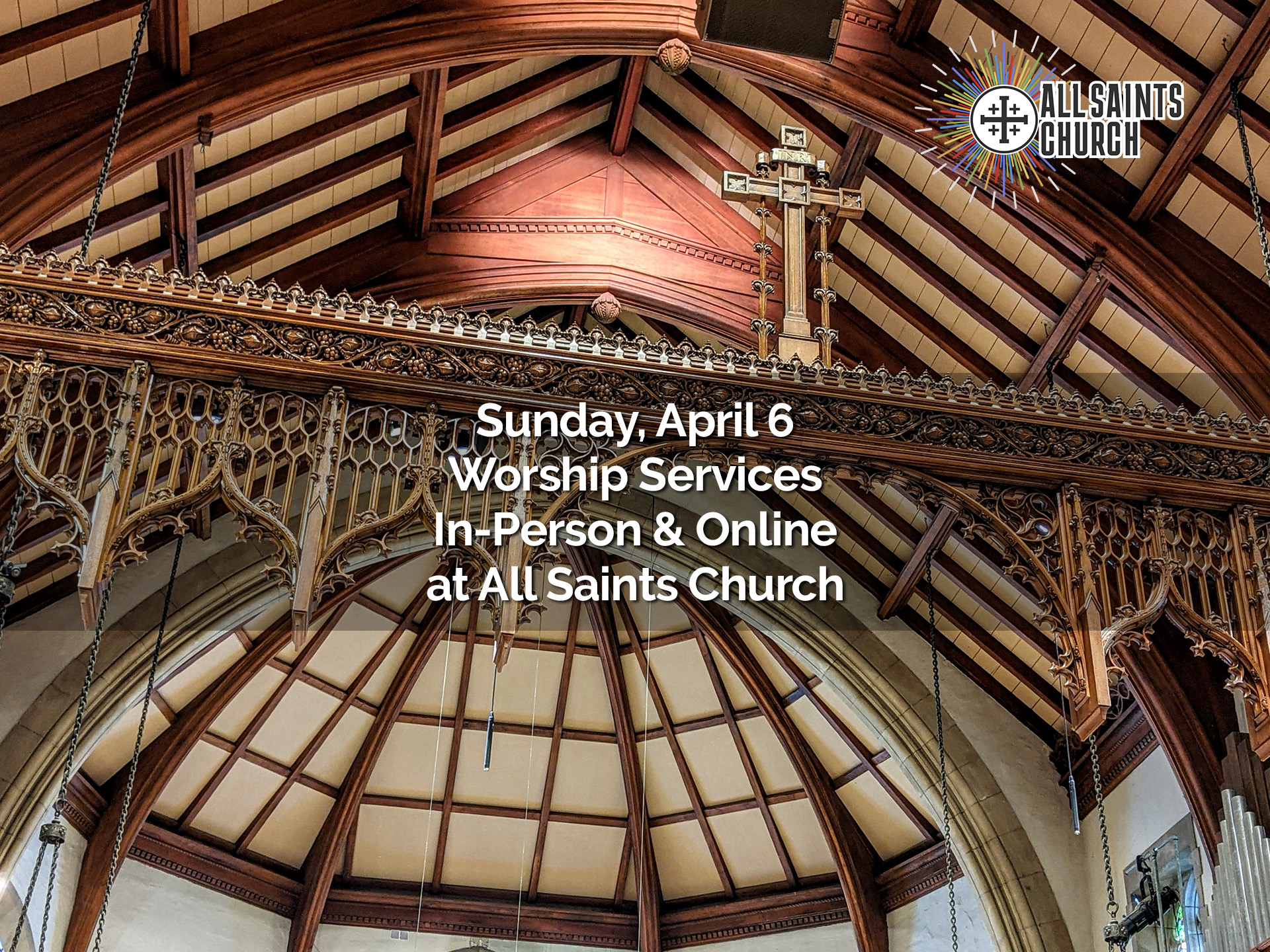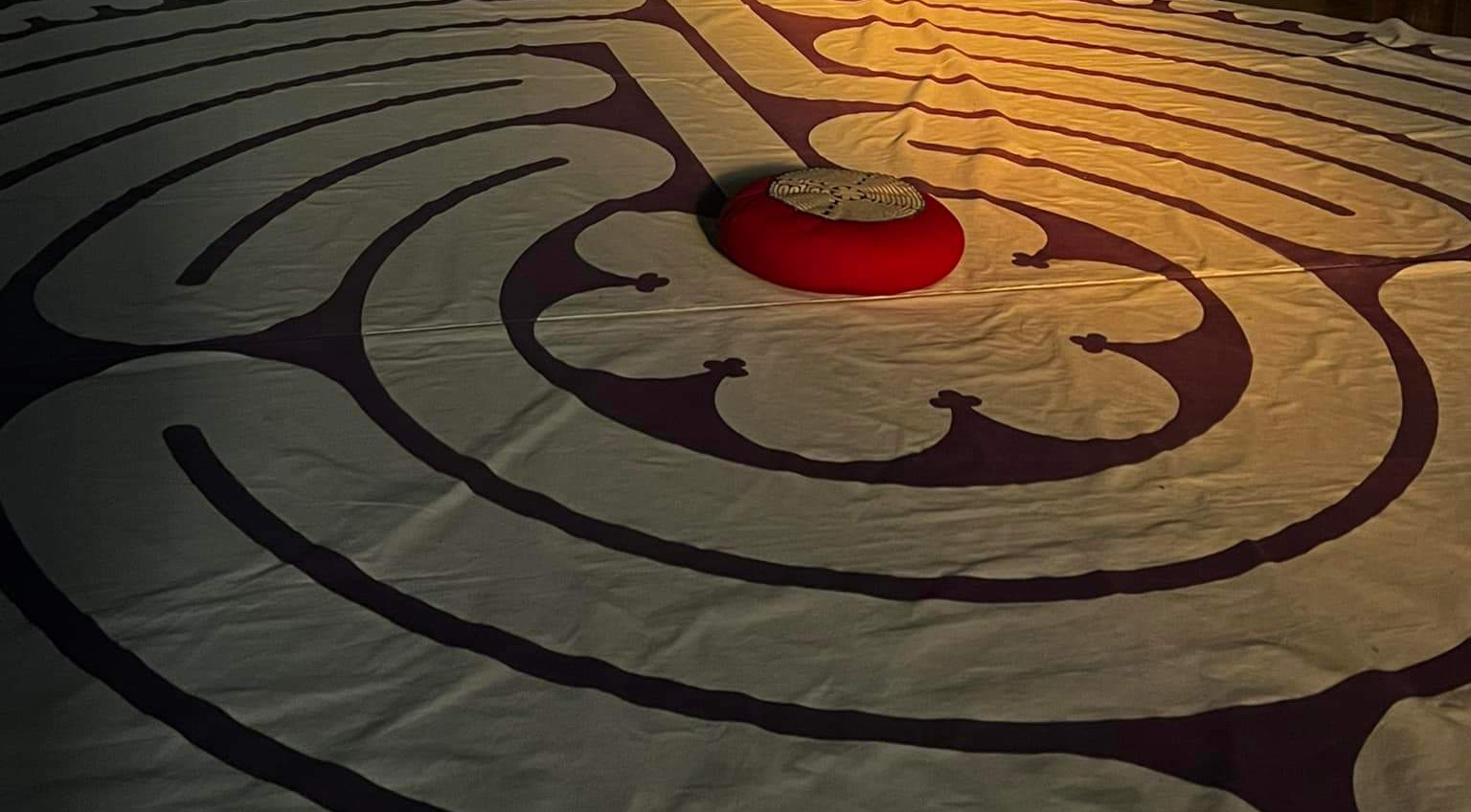by Mike Kinman, Rector of All Saints Church, Pasadena
The gospel isn’t meant to be gulped down on Sunday morning, but gnawed on through the week so it really becomes a part of us. You’ve got to work at it, like a dog with a good bone! Here’s the Gospel for this coming Sunday —Palm Sunday— with some notes and more “food for thought” on liberation from the expectations of others as we journey with Christ into the center of power. Gnaw away!
Palm Sunday: Matthew 21:1-11
There are two Gospel readings on Palm Sunday. The following is the reading for the Liturgy of the Palms, which opens the service. We will also be reading the Passion Gospel — Matthew 26:14-27:66.
When Jesus and his disciples had come near Jerusalem and had reached Bethphage, at the Mount of Olives, Jesus sent two disciples, saying to them, “Go into the village ahead of you, and immediately you will find a donkey tied, and a colt with her; untie them and bring them to me. If anyone says anything to you, just say this, `The Lord needs them.’ And he will send them immediately.” This took place to fulfill what had been spoken through the prophet, saying,
“Tell the daughter of Zion,
Look, your king is coming to you,
humble, and mounted on a donkey,
and on a colt, the foal of a donkey.”
The disciples went and did as Jesus had directed them; they brought the donkey and the colt, and put their cloaks on them, and he sat on them. Avery large crowd spread their cloaks on the road, and others cut branches from the trees and spread them on the road. The crowds that went ahead of him and that followed were shouting,
“Hosanna to the Son of David!
Blessed is the one who comes in the name of the Lord!
Hosanna in the highest heaven!”
When he entered Jerusalem, the whole city was in turmoil, asking, “Who is this?” The crowds were saying, “This is the prophet Jesus from Nazareth in Galilee.”
The Backstory – What’s Going On Here?
The story of Jesus’ triumphal entry into Jerusalem is the beginning of the end of the Gospel. These last eight chapters will be devoted to one week that begins with this event, includes his last night with his disciples, his arrest, crucifixion, death, and finally, his resurrection — which we
walk through together in Holy Week.
Three brief passages set the stage for Jesus entering Jerusalem. The first (Matthew 20:17-19) is his third and final prediction of his death and
resurrection. The second (Matthew 20:20-28) is his linking of greatness with sharing in Jesus’ suffering. Finally, in Matthew 20:29-34), Jesus
gives sight to two blind men of Jericho.
The progression of these events mirrors what is to come. Jesus will suffer, die and rise again. The disciples will have to undergo a similar path —
suffering and death — if they are to share in the glory of the resurrection. Finally, the ultimate destination will be sight for the blind people of Israel.
A few things to chew on:
The people who are waving palms and laying down their garments before Jesus have very clear expectations of him. They want him to be the
conquering messiah who will overthrow the Romans and restore the sovereign nation of Israel. They truly want him to be the King of the Jews, in the line of David. N.T. Wright, in his book Matthew for Everyone, notes:
“Jesus intends to answer these and all other prayers. He doesn’t wait for our motives to be pure, or for us to have sorted out our lives to the point where we can look him in the face, eye to eye as it were, and do business with him … However, at the same time, he must answer in his own way.”
What are our hopes of Jesus and our motives in approaching him? How can we be open to him “answering in his own way.”
*The crowd chants, “Hosanna to the Son of David.” I wonder if they knew what they were saying about themselves when they said this. David was the king God anointed when the people of Israel had gone astray — first by demanding a king, and second by following the king God gave them, Saul. David’s emergence reminded the people that they were not like other nations, people of a king. Instead, they were people of the living God … and they must live and judge themselves by completely different standards.
Given that, it would be silly to expect a “Son of David” to take the expected route of military insurrection, for him to play by the rules like
other “great” rulers. What are our expectations of Jesus? What rules do we expect him to play by?
Try This:
One of the easiest things to become a prisoner of is the expectations of others. Our lives are full of times when we can choose between doing the
hard thing that confounds other’s expectations and the easy thing that will be celebrated by whomever the crowd might be.
This week, take a few minutes each morning to think about the day past and the day to come. Where are you held hostage by expectations of others? What opportunities to make bold, difficult choices for love lie before you? How can you ask God for the gift of discernment and the grace and power to live with integrity?
Write This:
Matthew says the result of Jesus entering Jerusalem is that “the whole city was in turmoil.” That’s what happens when the Gospel intersects with coercive power. Yet many of us fear the chaos of turmoil, fear the anger and rejection that comes with being the one who brings it (and with good reason … look what happened to Jesus). If you write, this week, journal about your relationship with turmoil and chaos. Does it energize you? Does it terrify you? Do you run to it or run from it? What is your history with chaos and turmoil … and what prayer do you have for God in the midst of it?
It’s a party! Bring what you have.
On Palm Sunday we give permission for our liturgy to what it really should be every Sunday. A wild celebration.
And we celebrate exactly what the people in Jerusalem were celebrating. That the deepest most abundant life we could ever know is here. Jesus.
Right here. Right in the middle of us.
This begs a question — for liturgy and for life. If Christ is here, how do we respond?
Let’s take a clue from those people in Jerusalem that day. They brought what they had and said to Jesus “use this.” And when there were things they needed that they didn’t have, they went and asked for it … asked for it with a simple statement and a promise.
The simple statement : “the Lord has need of it.”
The promise “and he will send it back immediately.”
That’s what our whole Christian life is. It’s opening ourselves up to respond to the life-changing presence of Christ by letting go of all that
we are and have and using it to honor Christ and trusting in the promise that nothing will be lost, that all will be returned to us … and that in
fact it is in the act of giving that we find the life that is worth celebrating.
Christ reminds us that we are at our heart more than just a church, even more than just a community. We are a gathering movement of proclamation and celebration. A movement to kiss the world and transform it with Christ’s love.
What do you have to offer?
Are you an artist?
Are you a writer?
Are you a builder?
The Lord has need of it!
Can you fix a car?
Can you pray?
Can you write a letter to your Senator?
Can you teach a child to read?
Do you have money?
Do you have time?
Do you have a song in your heart?
The Lord has need of it!
We don’t need to be afraid. We’re not going to lose anything. The Lord has need of it and will return it to us immediately. Return it to us in a life
we can’t beat anywhere.
This is not the time to hold back. This is not the time to say “Yeah, But…” This is the time for Hosanna. The journey of Holy Week is the journey
of Christ right into the center of power … where we get changed and the world gets changed.
If we are not just going to walk with Christ into the center of power, the center of the way things are … but if we are going to be that Body of Christ on that journey into the center of the way things are and let Christ work through us to turn them into the way things oughta be, now is the moment.
It’s a celebration. It’s a party. And we’re all invited. Come as you are. Bring whatever you have. Don’t be afraid.
The Lord has need of it and will return it to you immediately.
Check out the rest of Sunday’s readings
The Lectionary Page has all of the readings for this Sunday and every Sunday — click here for this Sunday’s readings.
Collect for Sunday: Pray this throughout the week as you gnaw on this Gospel.
Almighty and everliving God, in your tender love for the human race you sent your Son our Savior Jesus Christ to take upon him our nature, and to suffer death upon the cross, giving us the example of his great humility: Mercifully grant that we may walk in the way of his suffering, and also share in his resurrection; through Jesus Christ our Lord, who lives and reigns with you and the Holy Spirit, one God, for ever and ever. Amen.
Want to read more?
“The Text This Week” is an excellent online resource for anyone who wants to dive more deeply into the scriptures for the week.



